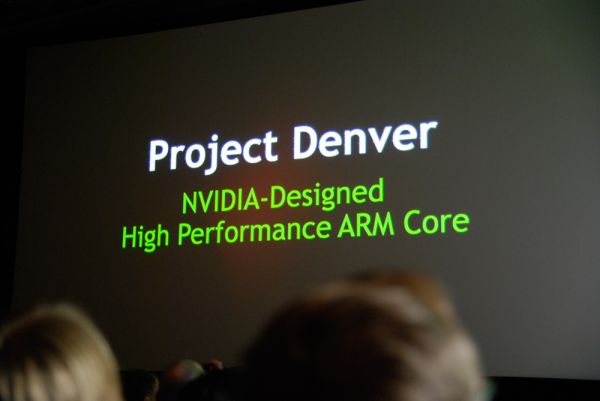NVIDIA's Project Denver: NV Designed, High Performance ARM Core: Updated!
by Brian Klug on January 5, 2011 4:00 PM EST- Posted in
- Smartphones
- Arm
- Project Denver
- Mobile
- SoCs
- NVIDIA
NVIDIA's CEO, Jen-Hsun Huang just announced Project Denver - its first CPU architecture design ever, based on ARM's ISA. This is a custom design done by NVIDIA in conjunction with ARM and targeted at the high performance computing (HPC) market.
This is a huge announcement from NVIDIA, but not entirely unexpected. Prior to Project Denver NVIDIA licensed ARM IP but developed its own IP everywhere else for use in Tegra. Going forward, NVIDIA is turning into a full fledged SoC architecture company. This is a huge step in NVIDIA becoming a major player in the SoC evolution going forward.
Update: NVIDIA provided some more details on the announcement. Project Denver is targeted at everything from PCs to HPC/servers. This is completely a high end play going after the x86 stronghold. Project Denver ties in completely with Microsoft's announcement to bring Windows 8 to ARM next year.
NVIDIA also announced that it will be licensing ARM's Cortex A15 core, presumably for use in lower end devices (e.g. smartphones). I wouldn't be surprised if NVIDIA eventually moves to its own architecture based on ARM across the board.











47 Comments
View All Comments
Wiggy McShades - Saturday, January 8, 2011 - link
arm is actually better than x86, if you were going to design a cpu from the group up. When you design an x86 cpu you end up translating the x86 instructions into RISC instructions anyway, so it really brings up the question why you would design a x86 processor in the first place if you didn't have to. So if we can cut out the translation of instructions there could be a gain in performance and power draw. Look at the kind of performance we are getting from sub 1 watt parts, what would stop a less power conservative arm based design from being high performance?Quantumboredom - Wednesday, January 5, 2011 - link
The article seems a bit unclear, is this a CPU design targeted at the HPC market, or the smartphone/tablet market? The article seems to imply both, but can they possibly be targeting such vastly different markets with one CPU design? First paragraph says it's targeted at HPC, while the second says it's a huge step in the smartphone evolution.AmdInside - Wednesday, January 5, 2011 - link
I think high performance means not for phones. With todays announcement of next version of Windows for SoC, its not unlikely this will be part of a large lineup of personal computing products, not just tablets and phones. But i could be wrong.Metaluna - Wednesday, January 5, 2011 - link
The article says Project Denver is targeted to PC's and servers. Then they later mention that NVIDIA also licensed the Cortex A15 core for low-end devices like smartphones, but that is a separate development effort from Project Denver.Quantumboredom - Wednesday, January 5, 2011 - link
Yeah the update clarified it. Man would it be cool if Windows truly moved to be fully supported on both x86-64 and ARM, that could lead to some awesome competition in the CPU field!Next9 - Thursday, January 6, 2011 - link
Windows? The only reason everybody use this ugly piece of SW is it has plenty of x86 Apps and good consumer support for Hardware and people are used to this stuff. If you switch x86 to ARM on Windows, you loose everything you probably like on this system. Windows stays and falls tied to x86 architecture.If ever ARM become a true alternative to x86, it will be Linux, who dominate this field. You can run every Linux app on ARM even today.
AnandThenMan - Thursday, January 6, 2011 - link
Loose=your momLose is the word you're looking for.
As for x86 and applications, they can always be re-compiled if there is demand. But I would love to see an alternative to x86, definitely.
strikeback03 - Thursday, January 6, 2011 - link
Someone would have to put a friendlier face on Linux I think. Remember, netbooks originally came with Linux, but moved to Windows because customers were confused. Linux has the potential to be superior in just about every way except customer comfort on an Atom netbook, but you don't see it unless the end user put it there.Luke.mc - Thursday, January 13, 2011 - link
I think not having any good games or programs out of the box would confuse enough Windows users, which makes Linux far more appealing.LostPassword - Wednesday, January 5, 2011 - link
it has begun!Nvidia banking on android.